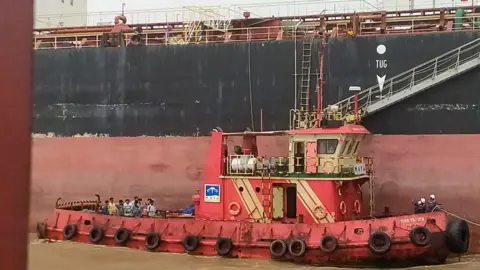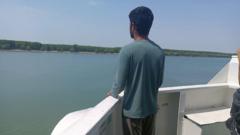Why India tops the list of abandoned sailors
 BBC
BBCManas Kumar* has been abandoned on a cargo ship in Ukrainian waters since April.
The Indian seaman was part of a crew of 14 transporting popcorn to Turkey from Moldova when the vessel was raided on 18 April, as it made its way down the Danube river which divides Ukraine and Romania.
Ukraine claimed the vessel, Anka, was part of Russia's "shadow" fleet, which it said was being used to sell "looted" Ukrainian grain to third countries.
But Mr Kumar, who is Anka's chief officer, said that the vessel was running under the flag of Tanzania and was managed by a Turkish company.
But exactly who owns the ship is not clear from the papers provided by the crew, made up of Mr Kumar, five other Indian nationals, as well as two Azerbaijanis and six Egyptians.
All are still on board, five months later - despite Ukrainian authorities informing them they were free to leave as they were not under investigation, Mr Kumar said.
The problem is disembarking means the crew losing their salaries - amounting to $102,828 by June all together, according to a joint database of abandoned ships maintained by International Labour Organization (ILO) and International Maritime Organization (IMO).
The BBC has reached out to the ship's management and owners on details provided by the crew.
Mr Kumar says that the crew was not aware of the ship's past at the time of taking the job. Now stuck in a situation far beyond their control, the crew wants a quick resolution.
He says the owner and Indian shipping officials keep asking us for one more day to resolve the crisis but nothing promising has come out yet.
"This is a war zone. All we want is to return home quickly," he told the BBC.
India is the second-largest supplier of sailors and crew of commercial ships globally.
But it also tops the list of crew members known as "abandoned seafarers" - a term used by 2006 Maritime Labour Convention to describe the situation when shipowners sever ties with the crew and fail to provide them for repatriation, regular provisions and wages.
According to the International Transport Workers' Federation (ITF), which represents seafarers globally, there were 3,133 abandoned sailors across 312 ships in 2024 - of which Indian nationals accounted for 899.
For many, leaving the ship without a salary is not possible - especially if they have already paid hefty sums to agents for landing the job or for acquiring training certifications, Mohammad Gulam Ansari, a former seafarer who helps repatriate Indian crew from other parts of the world, tells the BBC.

The most significant reason for abandonment is the widespread practice of registering ships - called flags of convenience - in countries that have weak shipping rules, according to ITF.
International maritime rules allow a ship to be registered or flagged in a country different from its owners.
"A country can set up a ship registry and charge fees to shipowners, while having reduced standards for crew safety and welfare and often failing to live up to the responsibilities of a genuine flag state," the ITF website states.
This system, the group says, also obscures the identity of the real owner, which helps dubious owners ply ships.
ITF data shows that in 2024, around 90% of the abandoned vessels sailed under a flag of convenience.
But complications arise also because of the globalised nature of the shipping industry, with owners, managers, flags and crews of the ship often coming from different countries, industry observers say.
On 9 January 2025, Captain Amitabh Chaudhary* was steering a cargo vessel from Iraq to the United Arab Emirates when bad weather forced him to make a slight detour.
Minutes later, Tanzania-flagged Stratos vessel hit rocks underneath and damaged its oil-laden tank, forcing an unplanned stall near Saudi Arabia's Jubail port.
The crew - including nine Indians and one Iraqi - made several attempts to float it again but they failed.
Stuck, they waited there for help for nearly six months before the ship was refloated.
The ship's Iraqi owner, meanwhile, refused to pay their salaries citing losses incurred due to the stalled vessel, Mr Chaudhary told the BBC.
The BBC reached out to the owners of the ship for a response to these allegations but they didn't respond.
 BBC/ITF
BBC/ITFSeafarers often blame India's maritime regulator, Directorate General (DG) of Shipping - which is tasked with verifying the credentials of ships, their owners and recruitment and placement agencies - for lax scrutiny of stakeholders. The DG Shipping didn't respond to a request for comment.
Others, however, point out that even the crew needs to be more vigilant.
"When you are hired, you get enough time to inform the DG Shipping [about any discrepancies in your contract]," said Sushil Deorukhkar, an ITF representative working for the welfare of the seafarers. "Once you sign the papers, you are stuck and have to knock on every door for resolution."
Things can get complicated even for the crew on Indian-owned ships operating within the country's waters for a variety of reasons.
Captain Prabjeet Singh was employed on Nirvana, an Indian-owned, Curacao-flagged oil tanker, with 22 other Indian crew members. It had recently been sold to a new owner, who wanted it decommissioned, and their salary was under dispute between the new and old owners.
In early April, Mr Singh was taking it to a port in western India's Gujarat state for dismantling when an Indian court ordered its seizure "for non-payment of crew", according to the ILO-IMO database.

Within days, the crew realised they were abandoned, Mr Singh said. "We were without adequate food and provisions. The ship had run out of diesel and was in complete blackout," Mr Singh told the BBC. "We were forced to break and burn the ship's wood to cook food."
Hired in October 2024, Mr Singh had hoped to earn a decent living with this job, and that is why leaving the ship without salary was not a viable option for him.
The crew could finally disembark on 7 July after a court-ordered settlement. But the crew's wages remain unpaid despite the court order, according to the ILO-IMO database.
Back in the Gulf, the crew of Stratos said their biggest fear was that the hole in the ship's bottom would sink it.
But the immediate challenge, they found, was hunger.
"For days, we had to eat only rice or potatoes because there were no supplies," Mr Chaudhary told the BBC last week.
After nearly six months, the crew finally managed to float the ship back - but the accident had left its rudder damaged, making it unfit to sail.
The crew are still at the ship waiting for their salaries to be paid.
"We are still at the same place in the same situation. The mind has stopped working, can't think what [more] we should do," Mr Chaudhary said.
"Can we get some help? We just want to go home and meet our loved ones."
*Some names have been changed to protect identity


